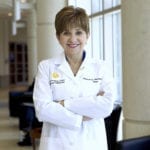
The goal of a vaccine is to give you protection against a pathogen – without you having to suffer through the illness. With so much talk about developing a COVID-19 vaccine, we turn this week to Dr. Kai McKinstry, a virus expert at the Burnett School of Biomedical Sciences, who is working to create a flu vaccine you would only have to take once in your lifetime – not every year.
In the “olden days” of vaccines, we actually used dead or animal viruses that are closely related to human infections to inoculate people against disease. For example, the first small pox vaccine was, in fact, a pox virus that sickened cows but did not cause disease in humans. Today, scientists are developing better methods to create vaccines. The challenge is to create a safe one that protects a genetically diverse population against disease – and in the case of COVID-19 to do it quickly.
Genetics is important because recent research shows that your genes play a key role in whether you catch a virus and, if you do, the severity of your illness. We see that with COVID-19, which causes mild symptoms in some people and devasting illness and death in others. Why? One reason is age – the body’s immune system weakens as we get older. But the latest research also suggests that a person’s genetics—and even the order in which they received vaccinations or got diseases earlier in life — plays a role in protecting them from viruses or actually causing them to become sicker if they’re infected.

Assistant Professor,
Burnett School of Biomedical Sciences
So the goal in creating a vaccine is to come up with one that will protect the most people – whatever their genetic makeup. To do that, scientists must first understand the microbiology of how a particular virus infects the body. What microscopic proteins allow the virus to enter the cells of our body and spread? What proteins in that virus signal our immunity to kick in and how can we speed up that protection? Once we have identified that microbiology, we can begin the process of creating a vaccine that triggers our immune system. Most vaccines encourage the body to make antibodies that basically shut the door and don’t allow a particular virus to enter our cells. Effective vaccines also need to imprint into our immune system a cellular “memory” so that protection from the pathogen lasts for some period of time.
The challenge in developing a vaccine is that viruses are very good at what they do – spreading and infecting. That’s why they mutate so often. Influenza is a perfect example. The virus is always changing – that’s why we have to get a flu shot every year. Each year we revise the vaccine so it will trigger our bodies to build antibodies against that year’s specific flu strain. Because the flu virus is always mutating, the vaccine isn’t foolproof. On average, it protects about 58 percent of the people who get vaccinated.
Some viruses are also very good at bypassing antibodies. They need another type of immunity defense to be stopped. Our lab is looking at harnessing the power of the body’s T cells as a vaccine. Your immune system has two types of T cells. Helper T cells push your other immune cells into action to mount a defense against a virus. Killer T cells actually target and destroy already-infected cells. T cells are looking promising in early COVID-19 vaccine research. But more study needs to be done.
And that’s a hurdle in creating a vaccine for a virus that is so novel. As scientists and physicians, we’re learning COVID-19’s characteristics, how to treat it and how to cure it in real time. Some early studies that were thought to have identified key aspects of the virus have since been debunked and withdrawn. In the past five months as we’ve lived with COVID-19, we have done some small research projects and have anecdotal evidence of possible treatments and preventions. But we have not had time yet for randomized control trials.
Everyone wants a vaccine now and many researchers are working to find one that is safe and effective. The challenge is that science takes time.
COVID-19 health tips are brought to you by UCF’s Academic Health Sciences Center (AHSC), which includes the Colleges of Health Professions and Sciences (CHPS), Medicine, Nursing and Student Health Services.
Post Tags
- covid COVID-19 health tip vaccine
